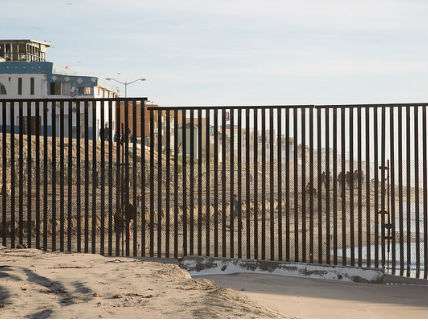Surprise: Republicans Have a Sensible Plan to Fix Immigration
They'll let states enact their own guest-worker programs.
President Trump is a man who prefers blunt instruments: He thinks he can solve America's complex immigration issues with a "big, beautiful

wall." Meanwhile, two members of his party—Sen. Ron Johnson of Wisconsin and Rep. Ken Buck of Colorado—have come up with a vastly more elegant solution to help the country meet its future labor needs. (Sen. John McCain has signed on as a cosponsor, too.) There are no walls involved—just a plan to let states set up their own guest worker programs.
Besides being inherently sound, the great upside of this approach is that it would sidestep the messy politics in Washington that have long made sensible immigration reform well nigh impossible. And we know that it works: It already does in Canada.
You wouldn't know this from all the restrictinionist screaming about mass immigration, but the American labor market is very tight, and growing tighter, as the latest jobs numbers show. On the high end, companies need at least twice as many foreign tech workers as Uncle Sam will let them hire. As usual, this year's annual H-1B visa cap for 85,000 high-skilled workers filled up within days of opening. Companies that don't land a visa this year will have to wait a year before they can re-enter the H-1B lottery—by which time the foreign techie they were planning to hire will be working for an Australian or Singaporean company.
But high-tech companies are the lucky ones. Matters are far worse on the low-skilled front. Farmers need H-1A visas to hire farmhands. But the requirements for these visas are so onerous and the outcome so uncertain that they are practically unusable. Meanwhile, the demand for seasonal laborers in industries such as construction, landscaping, and hospitality is about four times the annual allotment of visas. The worst part, though, is that by the time federal bureaucrats are done processing the applications, the season is done.
Johnson and Kirk want employers to have options beyond the rotten choices Uncle Sam makes available. Their bill, called the State-Sponsored Visa Pilot Program Act of 2017, would give each state a modest 5,000 annual allotment to hire whoever it wants from abroad regardless of skill level, confining the federal government's role to conducting security and health checks. This allotment would be adjusted each year based on economic growth.
The foreign workers brought in on these visas would be confined to working in the sponsoring state—or states that form a compact to honor each others' visas — which is a whole lot better for workers than being tethered to the sponsoring employer. States that feel strongly about keeping out foreign workers don't have to participate. And to ensure that these workers don't skip town and illegally take up employment elsewhere, the participating states would require these workers to post a $4,000 bond that would be returned at the end of their term if they stayed put.
States that have more than a 3 percent non-compliance rate would lose 50 percent of their visa allotment the following year (and would be required to up their bond amount by $1,000 per visa). Conversely, those that meet the stipulated compliance rate—which won't be hard to do given that only 2 percent of illegal overstays involve guest workers—would be rewarded with a 10 percent increase in their visa quota in subsequent years.
These elaborate provisions were included to placate restrictionist states that don't want to be flooded with foreigners. But it's actually overkill, at least if the experience of our neighbor to the north is any indication.
Canada implemented a similar Provincial Nominee Program 20 years ago. And even without bonding and other requirements, provinces on average are able to retain 80 percent of the sponsored workers. This is particularly remarkable given that the PNP program hands foreigners' permanent residency—the equivalent of America's green card—and not temporary work visas as the Johnson bill is proposing. This means they are free to work anywhere in the country from the day they land in Canada.
Why have provinces been so successful in hanging on to foreign workers when they are free to work anywhere? Essentially because they do such a granular matching of foreign workers and local labor needs that these workers don't need to go looking for work in better climes.
One great upside of the Johnson-Buck approach is that it could offer a workable fix to the amnesty war by allowing states to sponsor undocumented workers as part of their allotments and potentially take them off the hands of states that don't want them. Utah's conservative legislature, appalled by its neighbor Arizona's harsh treatment of undocumented Latinos, has been asking the federal government for permission to do just that, in fact.
Immigration is a federal function under the U.S. Constitution, but that doesn't mean that Uncle Sam can't hand over some of its authority to states to craft their own immigration policies. Indeed, the Johnson-Buck proposal is in the best traditions of American federalism that allows states to become the laboratories of democracy on immigration, exactly as the Founders intended.
States that fear the fiscal burden or native job losses from more foreign workers can bow out. And those that believe the reverse can opt in without Washington imposing a one-size-fits-all solution on everyone.
Trump can keep pounding his fist and demanding his border wall. But this bill offers an amicable—and costless—way forward on an issue that has polarized Americans for far too long. It is no skin off anyone's back—not even the most ardent restrictionists'—and therefore deserves widespread support on Capitol Hill.
This column originally appeared in The Week.


Show Comments (52)